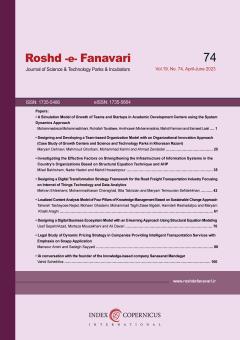A Simulation Model of Growth of Teams and Startups in Academic Development Centers using the System Dynamics Approach
Subject Areas : Science and Technology Parks and Incubators
Mohammadreza Mohamadkhani
1
,
Ruhollah Tavallaei
2
,
Amirhossein Mohammadinia
3
,
mahdi farmani
4
![]() ,
Esmail laali
5
,
Esmail laali
5
1 - PhD candidate, Adaptive management and development department, Faculty of Management & Accounting, Allameh Tabatabaei University, Tehran, Iran
2 - Assistant Professor, Faculty of Management & Economy, Imam Hossein University (AS), Tehran, Iran
3 - PhD candidate, Industrial Management department, Faculty of Management & Economy, Imam Hossein University (AS), Tehran, Iran
4 - MSc, Business management department, Faculty of Management & Accounting, Farabi Campus University of Tehran, Iran
5 - MSc, Aerospace Engineering department, Faculty of Aerospace Engineering, K. N. Toosi University of Technology, Tehran, Iran
Keywords: Growth of Teams and Startups, System Dynamics, Causal Loop Diagram, Simulation, Academic Development Centers.,
Abstract :
The purpose of this study is to provide a rich insight into the factors affecting the growth of teams and startups in Academic Development Centers. In this study, the factors affecting the growth of teams and startups were investigated using the system dynamics approach. At first, after reviewing the theoretical literature and the experts’ opinions, Variables affecting the growth of teams and startups were indentified and causal relationships among these variables were depicted. Then, the mathematical relations among these variables were determined and, accordingly, the study system was simulated at growth centre of technician and knowledge based units at Imam Hussein comprehensive university during the period 2016 to 2066. After designing the cause and effect diagrams, six scenarios for the growth of teams and startups were defined, which are: The growth center's share of the profits of successful companies, The effect of interaction with successful companies in promoting the level of entrepreneurial culture, The effect of effective communication with successful companies in attracting financial support for technology units, The effect of changes in the number of clients to enter the center on the system, Admission control policy and The effect of legal protections of technology units on the system. Of the six simulated scenarios, the fifth scenario has the greatest impact on the growth of teams and startups in Academic Development Centers. Therefore, the policy of maintaining the quality of services through controlling the amount of technology units entering the growth centers can be considered an effective and important policy.
